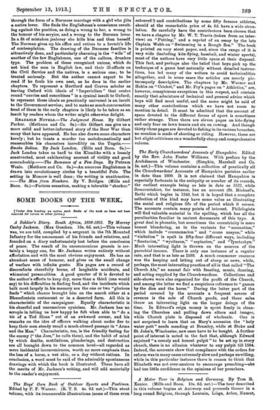The Early Churchwardens' Accounts of Hampshire. Edited by the Rev.
John Foster Williams. With preface by the Archdeacon of Winchester. (Simpkin, Marshall and Co. 5s. net.)—Thie volume contains a collection of practically all the Churchwardens' Accounts of Hampshire parishes earlier in date than 1600. It is not claimed that Hampshire is especially fortunate in the antiquity or number of its records, the earliest example being as late in date as 1522, while Somersetshire, for instance, has an account (St. Michael's, Bath) which begins in 1349, but it is hoped that a complete collection of this kind may have some value as illustrating the social and religions life of the period which it covers. The accounts contain many points of interest. Philologists will find valuable material in the spelling, which has all the peculiarities familiar in ancient documents of this type. A great deal is phonetic, but sometimes the eccentricity is mere honest blundering, as in the variants for "coronation," which include " crounenacion " and "crone nasyon," while "visitation" is spelt in fifty-four different ways, including " fesetacion," " wysitacon," " usytacion," and "-fysetashyn." Much interesting light is thrown on the sources of the parochial income. There is only one instance of a regular rate, and that is as late as 1599. A much commoner resource was the keeping and letting out of sheep or cows, while, perhaps, the most interesting practice of all is that called "The Church Ale," an annual fair with feasting, music, dancing, and acting supplied by the Churchwardens. Collections and side-shows were also organized for the profit of the Church, and among the latter we find a suspicious reference to "games by the dice and the horse." During the latter part of the period covered by the accounts a frequent source of revenue is the sale of Church goods, and these sales throw an interesting light on the larger doings of the time. In Edward's reign money is spent freely in clean- ing the Churches and pulling down altars and images, while Church plate is disposed of wholesale. One is not surprised to learn that on Mary's accession the "holy water pott" needs mending at Bramley, while at Stoke and St. John's, Winchester, new ones have to be bought. A further point of interest is noted in the fact that, although Edward enjoined "a comely and honest pulpit" to be set up in every church, there is no allusion whatever to any pulpit till 1594. Indeed, the accounts show that compliance with the orders for reform was in many cases extremely slow and perhaps unwilling, while in this particular instance there is reason to think that Elizabeth was not over-anxious to encourage preaching—she had too little confidence in the opinions of her preachers.










































 Previous page
Previous page